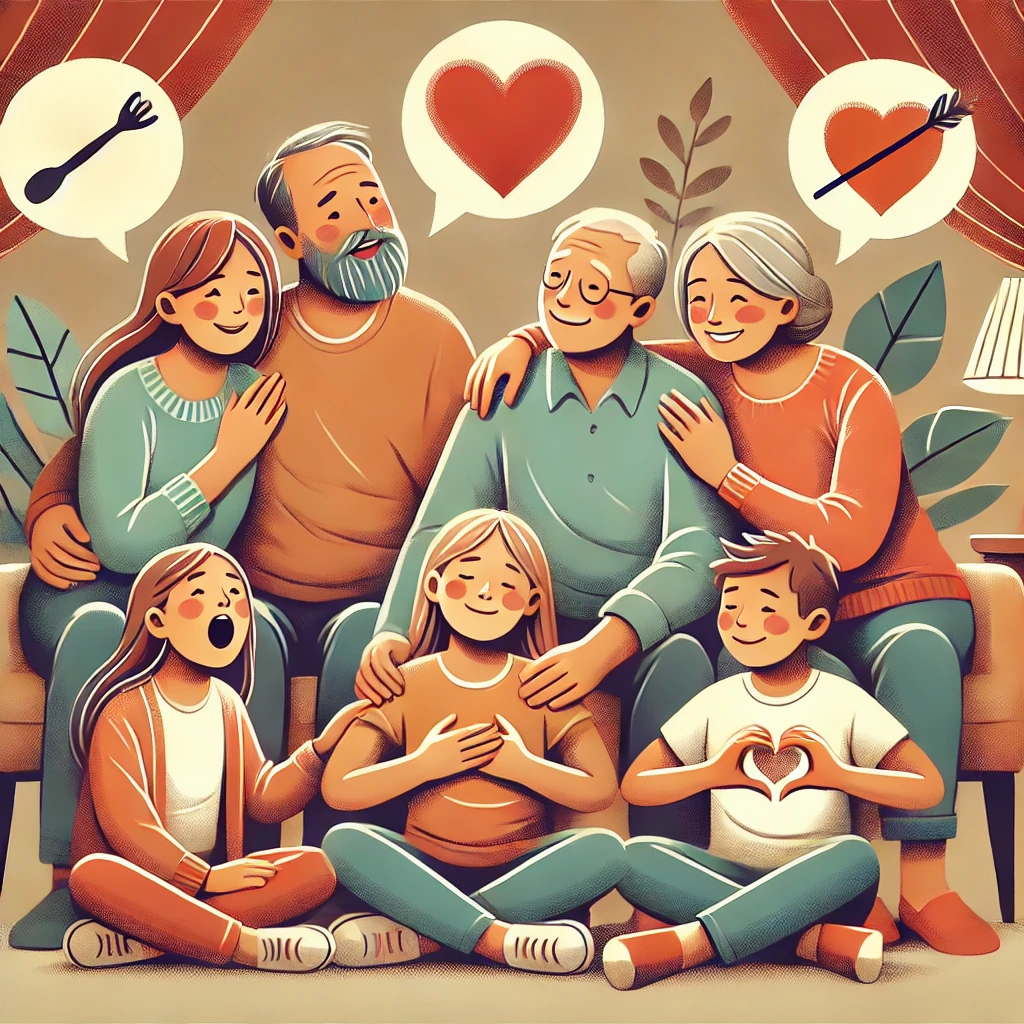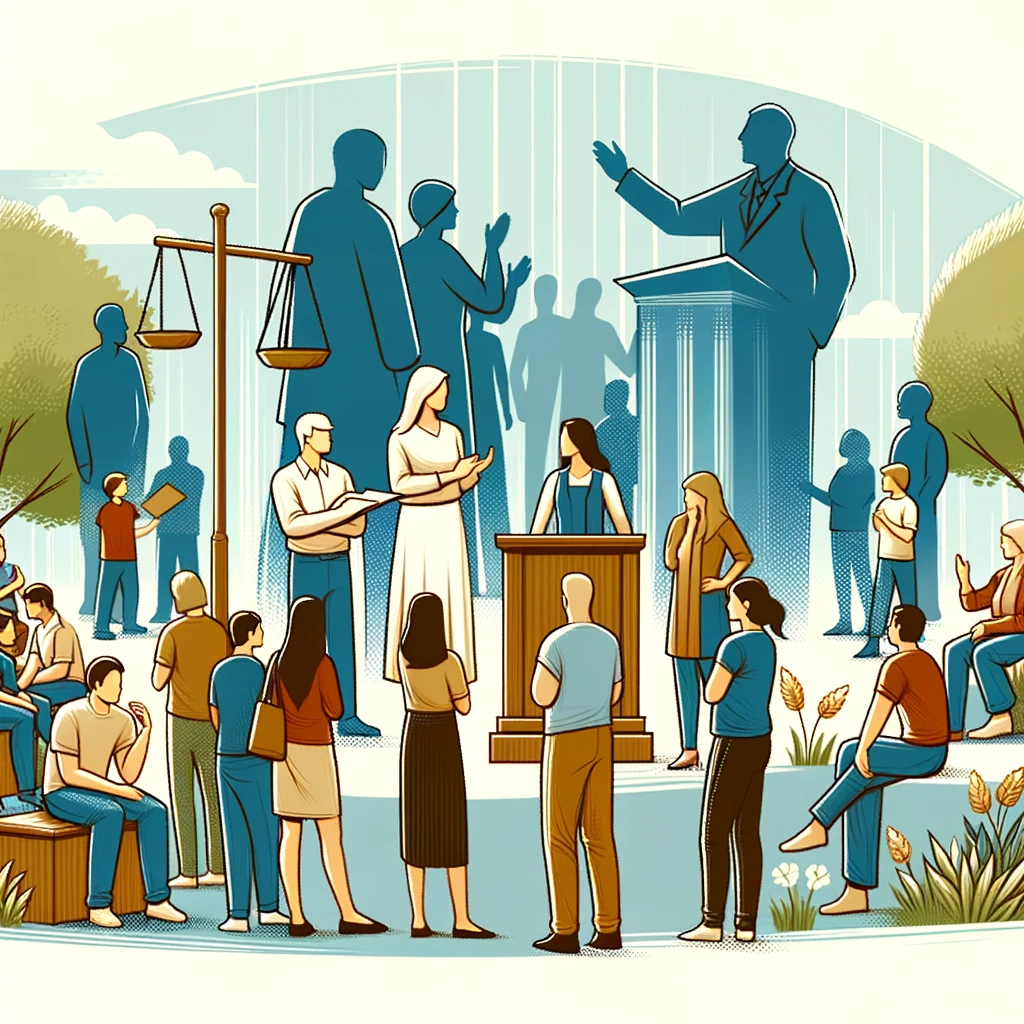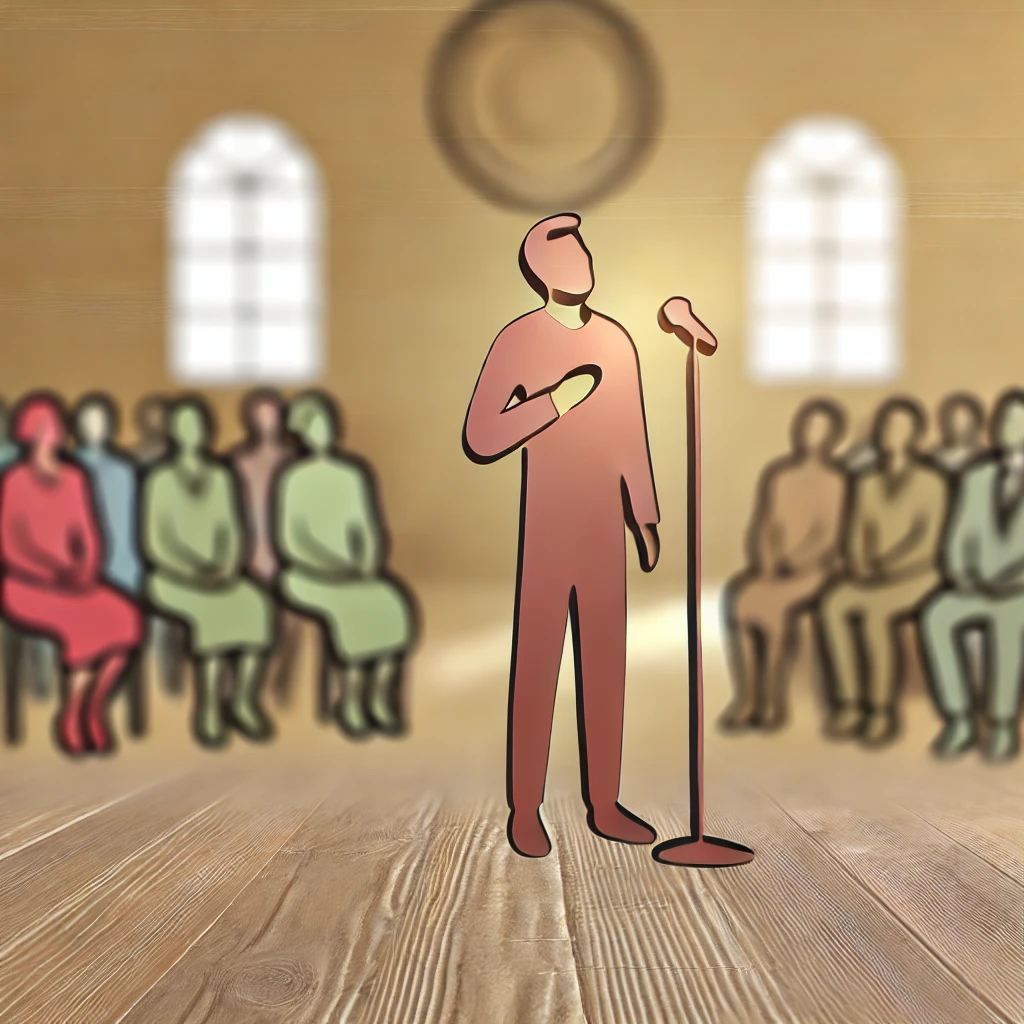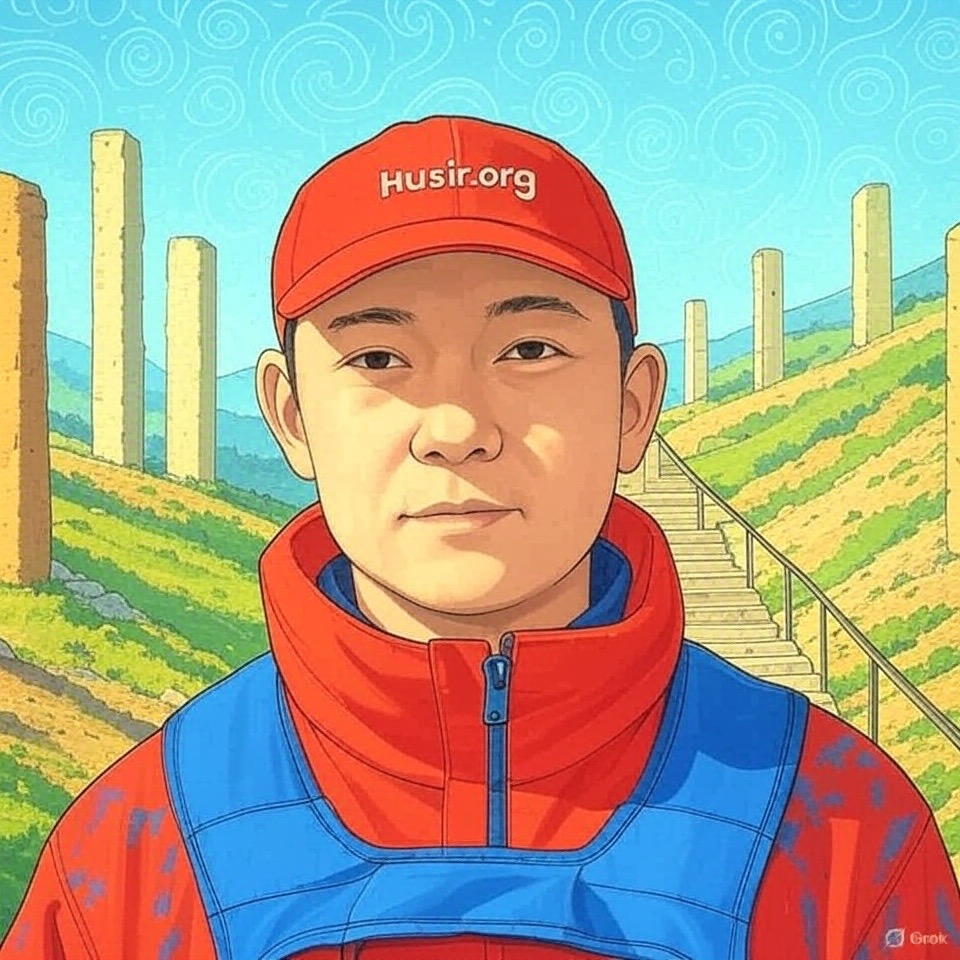弟兄姐妹们,今天说的是我长久以来“不好意思”说的话题,那就是人的自我和神的带领到底有多远的距离。这么说比较容易理解:每个人在大脑的闲暇时间里总会想到很多事情以及这些事情可能出现的结果,然而一旦遇到了真实场景后我们就会暗自庆幸很多想法其实是我们“多虑”了。可还有一种情况,我们在遇到很多涉及自身关键利益或虽重要但看起来不那么急迫的事情时却表现的优柔寡断,我们会将很多话和想法停留在仅仅是“想一下”而已的层面,从而耽误了更重要的事情,今天我们就探讨一下。
在我们日常生活中,许多人因为“不好意思”或“顾及面子”而选择沉默,隐藏真实的感受,压抑自我,结果往往导致家庭关系疏远、内心需求被忽视,甚至影响到我们共同生活环境的健康发展。可弟兄姐妹们想过没有,这种“面子文化”不仅束缚了我们的表达和行动,还使我们逐渐远离神的真理与爱。实际上,这种“脸皮薄”掩盖的正是人们对自我、对批判性思维和对真实生活的逃避。
今天的讨论揭示了这种沉默的深层贻误:这种“不好意思”不仅让我们与他人失去联系,更让我们与神的距离越来越远。作为信徒,我们被召唤去超越这种“面子”的束缚,勇敢地活出批判性思维的方式和真实自我,回归神的带领。
一、压抑内心情感的后果:对自我需求的忽视
许多人从小习惯了因“脸皮薄”而掩饰真实情感,尤其是对父母、家人或亲近之人的情感需求。小孩子常因害怕被批评、不想做“不听话的孩子”,而不敢表达对爱、关怀和被理解的渴望。然而,这种情感的压抑会在成长过程中逐渐形成一种内心的隔阂,使自己与父母、亲人疏远,甚至影响到自我接纳。成年后,这种未被满足的情感需求,往往成为原生家庭创伤的一部分,让人难以获得真正的心灵平安。
生活在新中国后的几代人,大约1950~70年代的吧,孩子往往面临着兄弟姐妹多、生存条件差的情况,那时候的绝大多数孩子能吃饱饭就已经很好了,父母根本无法顾及孩子们的情感培养和教育,因此孩子们连“不好意思”说自己想法的机会都很少获得。这样的孩子成为父母后很难说清楚爱为何物,能跟上时代的脚步下海、进外企打工赚钱、去抓白猫黑猫才是硬道理,哪里还知道要寄予自己的孩子什么样的培养和关爱?80后、90后就在这样的父母熏陶下出生、长大成人了,虽然他们在生活条件方面明显好了很多,也渐渐有了“不好意思”说自己想法的机会,但依然有很多人在父母本身就缺爱的环境下成长起来了。因此也就逐渐出现了“原生家庭”伤害这一说法,其实父母本不想伤害自己的孩子,无奈自己根本不知道没有爱的给予也是一种很深的伤害。
我小时候因为父母生活艰难,又缺乏照顾孩子的经验,只能把我送给姥姥、舅舅照顾,他们在莱阳农村将我从一岁半养到六岁半,然后才送回城市上学。现在我想,姥姥虽然养活了我的身体,不至于饿死,但我自己内心对母爱、父爱的渴求始终无法得以满足,甚至连开口要求的机会都没有。我的孩子、连同周围朋友的孩子获得的关爱可想而知了,虽然这个例子不怎么恰当,但的确是无以言表的遗憾。
孩子长大成人的过程一直是自己学习、思考、弥补这份爱的过程,从中看到了父母的罪、自己的罪以及悔改的甘甜,很欣慰的是在这个过程中看到了神的爱,“我从前风闻有你,现在亲眼看见你。”(约伯记 42:5 和合本)
可以说,每个人都有神赐予的内心需求,对爱、理解与信任的渴望是神所赐的宝贵情感。真正的信徒应当懂得,这些渴望需要勇敢地表达,而不是隐藏或抑制。我刚才的例子是六十年代比较常见的情况,更多的是小孩子因“不好意思”而掩饰的需求,若未能在成年后得到疗愈,可能会使人迷失自我、逐渐偏离神的真理。神是什么?是爱,所有的一切都关乎爱这一话题,可以说每个人都需要学会摆脱“面子”的束缚,认识并满足自己的需求,这不仅是回归自我,也是在活出神赐予我们的真实身份。“三岁看大、七岁看老”这句话实际上描述的是原生家庭里是不是有自由交流、人人平等的生活氛围,这才是孩子人生的起跑线。

二、亲密关系中的沟通缺失:家庭的疏远
家庭中,如果因“面子”而选择保持沉默,亲密关系必然受到影响。中国文化中的“中庸”思想让很多人习惯于对外人彬彬有礼,对家人却倾泻负面情绪。久而久之,这种“面子文化”使家庭失去了应有的坦诚和理解,亲密关系逐渐被冷漠和误解取代,彼此之间的爱流动不起来,小的方面是男女之间生活方式和原生家庭的差异影响,大的方面是夫妻生活理念和对孩子教育的方向等等。
家庭是神赐予我们爱的港湾,神希望我们在家庭中学会彼此包容、互相扶持。然而,“面子文化”让我们在家庭中丧失了真实的联结,使家庭成员彼此疏远,要知道家庭里不是将规则和面子的地方,家才是放下面子、架子实践爱的地方。每个人都需要勇敢地去表达爱与关怀,摆脱来自于中国传统社会和双方父母所谓“中庸”的束缚,在家庭中活出批判性思维和真诚的情感。只有这样,家庭才能真正成为神赐予我们的爱与理解的港湾。我也在“夫妻间信仰不一致的原因思考”一文中做了详细描述,有兴趣的朋友可以看看。
三、社会中的沉默:对不公现象的助长
当“不好意思”成为一种生活习惯时,社会中的不良现象也因此愈演愈烈。许多人面对社会中的不公和罪恶,往往因“脸皮薄”而选择沉默。这样的“沉默”不仅是对正义的忽视,甚至可以说是在默许不公的存在。这种消极的沉默无形中使不良现象有了滋生的空间,进一步影响社会的健康发展。
许多人面对社会中的不良现象,如有害食品泛滥、人口失踪、过度执法、医院对病人粗暴对待等情况,选择了沉默。特别是那些身处要职、拥有权力的人士,因为怕影响自己的利益,往往更不愿意站出来发声。这种“集体沉默”让不公和罪恶有了滋生的土壤,使社会问题愈演愈烈。
圣经教导我们“你不可为恶所胜,反要以善胜恶。”(罗马书 12:21 和合本)。选择保持沉默,实际上是在无形中助长罪恶的扩展,是一种消极的纵容。群体的“不好意思”不仅没有成为正义的捍卫者,反而成了罪恶的“帮凶”。这种“面子观”不仅让人丧失了对真理的追求,也让社会在沉默中逐渐远离公义和慈爱。
作为主题文化氛围里的信徒,让我们遇到这些社会问题时摆脱“中庸”和“面子”的束缚的确非常难,我本人也做不到,在此希望、呼吁更多的人学会用批判性思维去分辨是非,为公义发声。
神的教导是要让我们成为光和盐,去彰显祂的真理与公义。若因顾忌面子而保持沉默,我们不仅违背了神的教导,更让自己和社会逐渐远离神的爱。每一个勇敢发声的信徒,都是神在社会中的代言人,我们的行动可以带来社会的积极改变。

四、信仰赋予我们批判性思维和勇气,超越“面子”的束缚
信仰能帮助我们超越自我、超越恐惧,神赋予我们勇气去面对生活中的困难和不公,当我们感到良知受到触动时,那是神在提醒我们去行义、去站出来。然而,如果我们选择“脸皮薄”、“不好意思”为借口,这种沉默是否可以理解为一种对神的谎言呢?基督徒每天的祈求、祷告得到回应时不应凭自己有限的自我就白白的将神的带领抛弃在一边,是不是?
主耶稣曾说:"你们是世上的光。城造在山上,是不能隐藏的。人点灯,不放在斗底下,是放在灯台上,就照亮一家的人。你们的光也当这样照在人前,叫他们看见你们的好行为,便将荣耀归给你们在天上的父。”(马太福音 5:14-16 和合本)神的旨意是让信徒成为光和盐,影响他人,引导他们走向光明和真理。如果我们因为“怕麻烦”而保持沉默,我们就等于放弃了神赋予我们的责任。这不仅是在逃避对社会的责任,更是在逃避神对我们的召唤,拒绝神的带领。
我们生活的环境的确有很多问题,虽然头绪繁杂,但许多问题源于“不好意思”与“顾及面子”的束缚,最起码我们该用批判性思维的方式,渐渐打破“中庸”思维的限制,进而去分辨生活中的善与恶,真实与虚伪。信仰不是一种盲目的追随,而是帮助我们在世界中看清问题的本质。我们被召唤去关爱他人,勇敢发声,去追求公义。每当我们站出来表达真实的感受,揭露罪恶与不公,我们便是在活出神的真理,成为这个世界的光。
在家庭中,我们可以放下“面子”的假象,坦诚表达爱和理解,让家庭关系更加亲密。在社会生活中,我们更应当勇敢面对不公,为弱势群体发声,虽然各大社交平台有不同程度的言语筛查机制,但毕竟也算是保留了这些发声渠道。神赐给我们批判性思维和内在的勇气,让我们去关爱他人,承担责任,在家庭、社会和信仰中活出真实的自我。

结语
“不好意思”、“脸皮薄”看似无害,实际上使我们在生活中疏远了与亲人、社会的关系,究其根本是用我们“强大的自我”取代了神的带领,成为了每个人心中隐秘的偶像。这种沉默不仅让我们错失了爱的表达和社会责任,更让我们偏离了神的真理。神看每一个人都是宝贵的,祂不愿意我们在看似撒但掌权的世界里迷失,更不愿意松开我们的手。
愿我们每个人都能勇敢回应神的召唤,放下“面子”,在家庭中活出真实的情感,将“不好意思”活成神的自由和快乐,在社会中成为正义的见证,用信仰的力量为世界带来温暖和希望。
让我们一起为此祷告!
(如有建议敬请留言讨论,邮箱:[email protected])
How ‘Ashamed’ a Person Is, the Further They Are from God
Dear brothers and sisters, today I wish to discuss a topic I’ve long been hesitant to address—the gap between our self-centered attitudes and God’s guidance. It can be explained simply: in our idle moments our minds buzz with countless thoughts and possible outcomes. Yet when reality strikes, we often find ourselves secretly relieved that many of our worries were merely “overthinking.” Still, there is another situation: when matters crucial to our personal interests or important issues that seem not so urgent arise, we tend to be indecisive. Many ideas and words remain at the level of “just a thought,” thereby delaying more significant matters. Today, let’s explore this phenomenon.
In our everyday lives, many people choose silence or hide their true feelings out of “shame” or concern for saving face. In doing so, they suppress their authentic selves, resulting in estranged family relationships, neglected inner needs, and even harm to the overall health of our shared living environment. But have you ever considered that this “culture of saving face” not only constrains our expression and action but also gradually drives us further from God’s truth and love? In reality, such “thin-skinned” behavior is a cover for our avoidance of facing ourselves, critical thought, and genuine life.
This discussion exposes the deep cost of such silence: being “ashamed” not only disconnects us from others but also widens the gap between us and God. As believers, we are called to rise above this bondage of pride and to live out a critical-thinking approach to life and our true selves, returning to God’s guidance.
I. The Consequences of Suppressing Inner Emotions: Neglect of One’s Own Needs
Many people, from childhood, grow accustomed to hiding their true feelings out of “shame” or a concern for saving face—especially when it comes to expressing their emotional needs toward parents, family members, or those close to them. Children often fear criticism or being labeled “disobedient” and so dare not express their deep yearning for love, care, and understanding. However, such emotional suppression gradually creates an inner barrier over time, distancing us from our parents and loved ones and even affecting our self-acceptance. In adulthood, this unmet need for emotional expression often becomes part of the wounds incurred within the original family, making it difficult to achieve true inner peace.
For many generations growing up in New China (roughly the 1950s to the 1970s), children often faced crowded households and poor living conditions. At that time, simply having enough to eat was considered good fortune, and parents had little opportunity to nurture or educate the emotional lives of their children. As a result, these children rarely had the chance to honestly express their thoughts. Later, when such children become parents, they struggle to articulate what love really means. They chase after practical goals—seeking to work abroad, secure jobs in foreign enterprises, or “grab” success—while neglecting the nurturing and care their own children need. Many among the 80s and 90s generations were raised in environments where love was in short supply. Although their material conditions have improved and they gradually get the chance to speak openly, many have still grown up in families where emotional neglect was common. Thus, the term “original family trauma” has come into being. In truth, parents do not intend to hurt their children; rather, they are often unaware that a lack of love is a deep wound.
I recall that due to our parents’ difficult lives and lack of experience caring for children, I was sent to be raised by my grandmother and uncle in rural Laiyang from the age of one and a half to six and a half, before being returned to the city for schooling. In retrospect, while my grandmother ensured I survived physically, my inner longing for maternal and paternal love was never truly satisfied—nor was I given a chance to ask for it. Consider the love received by my children and those of my friends; while this example may not be perfectly appropriate, it does convey an ineffable regret.
The process of growing up is one of learning, reflection, and gradually making up for that lack of love. Through it, we come to see the sins of our parents, our own sins, and the sweetness of repentance. It is heartening that along the way we also catch sight of God’s love: “I have heard of You by the hearing of the ear, But now my eye sees You.” (Job 42:5 NKJV)
It can be said that every person has an inner need given by God—a precious desire for love, understanding, and trust. True believers should know that these needs must be expressed courageously rather than hidden or suppressed. The example I’ve just given was common in the 1960s: many children would hide their needs out of “shame.” If such needs are not healed later in life, they may lead one to lose oneself and gradually stray from God’s truth. What is God? He is love. Everything is ultimately about love. Each of us must learn to cast off the bondage of saving face, understand and meet our own needs, and thereby return to our true identity given by God. The saying “A child is known by the age of three; by seven, you can tell what he will be” actually describes whether an original family nurtures an environment of open communication and equality—a true starting line for a child’s life.

II. Communication Breakdown in Intimate Relationships: Family Estrangement
Within the family, if we choose silence because of “saving face,” our intimate relationships are inevitably compromised. The Chinese concept of “the Doctrine of the Mean” has led many to behave politely toward outsiders while venting negative emotions on family members. Over time, this “face-saving culture” strips the family of the frankness and understanding it should have. Intimacy gives way to coldness and misunderstanding—ranging from differences in lifestyle and original family influences between genders to conflicting marital philosophies and disparities in how parents educate their children.
A family is meant to be a haven of love gifted by God, where we learn to be tolerant and supportive of one another. However, the culture of saving face causes us to lose genuine connection, making family members drift apart. Remember that home is not a place for rigid rules and superficial appearances—it is the place to cast aside pretension and practice love. Each person must dare to express love and care, shedding the constrictions imposed by traditional Chinese society and the so-called “middle way” enforced by our parents. Only then can the family truly become the harbor of love and understanding that God intended. (I have discussed this in detail in my article “On the Reasons Behind Inconsistent Faith Between Spouses”—interested readers may refer to that.)
III. Silence in Society: How “Shame” Fuels Injustice
When being “ashamed” becomes a way of life, the negative phenomena in society only grow worse. Many people, when they face injustice or sin, choose to remain silent because of their “thin-skinned” nature. This kind of silence is not only a neglect of justice—it is, in effect, an implicit approval of wrongdoing. Such passive silence creates fertile soil for unhealthy practices to thrive, further hindering the healthy development of society.
Many, confronted with social problems such as the proliferation of harmful food, disappearances of people, excessive law enforcement, or rough treatment of patients in hospitals, choose to stay silent. Particularly those in positions of power, fearing an impact on their own interests, are even less willing to speak out. This “collective silence” creates an environment where injustice and sin can flourish, exacerbating social problems.
As the Bible teaches, “Do not be overcome by evil, but overcome evil with good.” (Romans 12:21 NKJV). Choosing silence only helps sin to expand and is a form of passive indulgence. The collective “shame” not only prevents us from defending justice, but also makes us complicit in sin. This saving-face mindset not only prevents us from pursuing truth but gradually distances society from righteousness and compassion.
As believers immersed in a culture marked by these attitudes, let us endeavor to break free from the constraints of “the middle way” and the pressure to save face. I, too, struggle with this, and I call upon more people to use critical thinking to discern right from wrong and to speak out for justice.
God’s teaching is that we are to be the light and the salt—to manifest His truth and righteousness. If we remain silent out of a fear of embarrassment, we not only violate God’s command but also distance both ourselves and society further from His love. Every single believer who dares to speak out is a representative of God in society, and our actions can bring about positive change.

IV. Faith Grants Us Critical Thinking and Courage to Transcend the Bonds of Saving Face
Faith helps us transcend ourselves and our fears. God grants us the courage to face life’s difficulties and injustices. When our conscience is stirred, it is God urging us to do what is right and to stand up. But if we choose to use “being thin-skinned” or “being ashamed” as an excuse, can that silence be seen as a lie to God? When our daily petitions and prayers are answered, should we then, with our limited self, disregard God’s guidance?
The Lord Jesus said, “You are the light of the world. A city that is set on a hill cannot be hidden. Nor do they light a lamp and put it under a basket, but on a lampstand, and it gives light to all who are in the house. Let your light so shine before men, that they may see your good works and glorify your Father in heaven.” (Matthew 5:14-16 NKJV). God’s will is that believers be light and salt, influencing others and guiding them toward truth and righteousness. If we keep silent out of “trouble” or a desire to save face, we are effectively shirking the responsibility God has entrusted to us. We are evading our societal responsibilities and running away from God’s call, rejecting His guidance.
Our living environment indeed has many problems, and although the issues are complex, many stem from the constraints of “shame” and saving face. At the very least, we should use our critical thinking to gradually break free of the limitations of “middle way” thinking, discerning between good and evil, truth and falsehood. Faith is not a blind following; rather, it helps us see the essence of issues in this world. We are called to care for one another, to speak out courageously, and to pursue justice. Every time we stand up to express our true feelings and expose sin and injustice, we live out God’s truth and become a light for the world.
In our family relationships, we can set aside the pretensions of “saving face” and genuinely express love and understanding, thereby drawing closer to one another. In society, we should boldly confront injustices and give voice to the vulnerable—even if various social platforms impose some degree of censorship, these channels still remain. God has endowed us with critical thinking and inner courage to care for others and shoulder our responsibilities, allowing us to live our true selves in our families, in society, and in our faith.

Conclusion
“Being ashamed” or “having thin skin” may appear harmless, but in reality, they alienate us from our loved ones and our communities. Fundamentally, this occurs because we let our “strong sense of self” replace God’s guidance, turning into hidden idols in our hearts. Such silence not only deprives us of the opportunity to express love and fulfill our social responsibilities, but it also leads us astray from God’s truth. God considers each one of us precious; He does not wish for us to become lost in a world seemingly ruled by Satan, nor does He want us to let go of His hand.
May we all courageously respond to God’s call, cast aside the chains of saving face, and live out genuine emotions in our families. Let’s transform our “shame” into an expression of God’s freedom and joy, and be witnesses of justice in society—using the power of our faith to bring warmth and hope to the world.
Please, dear brothers and sisters, let us join together in prayer for this!

发表回复